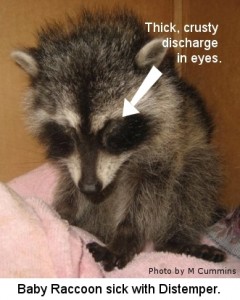“Distemper” is often used to refer to two diseases that show some of the same symptoms but are caused by different viruses. These diseases affect dogs and cats and many carnivorous species of wildlife, such as raccoons, foxes, and coyotes. The symptoms can be confused with rabies. In fact, many raccoons that are tested for rabies actually prove to be suffering from canine distemper.
Dogs suffer from “canine distemper,” characterized mostly by respiratory and neurological symptoms. The cat version is called “feline distemper” or “panleukopenia” (previous names included “cat fever” and “cat typhoid”). Members of the raccoon and weasel families may also catch feline distemper.
Neither disease has been shown to cause illness in people.

Canine distemper is the greatest single disease threat to the world’s dog population. It’s highly infectious and it’s nearly impossible for a dog to avoid exposure to this virus. More than 50% of the adult dogs and 80% of puppies that contract it die. Other effects include permanent problems with vision, hearing, sense of smell, and partial or total paralysis. Younger dogs and puppies are the most vulnerable (in wildlife, most cases are seen in the spring and summer, when wild canids, such as foxes and coyotes, bear their young).
Panleukopenia is also a highly contagious and common viral disease. Cats may catch distemper from contact with the blood, urine, droppings, nasal secretions, or fleas of infected cats or from contact with contaminated bedding, cages, food dishes, and the hands or clothing of handlers. Young kittens, sick cats, and indoor cats that have not been given boosters recently are most susceptible; older cats are more likely to have acquired some immunity. Pregnant females that contract the disease, even in its mildest form, may give birth to kittens with severe brain damage. Kittens less than 16 weeks of age may die at a rate of about 75%, and others at a rate of 50%.
- Vaccinate your pets. Vaccinate your pets. Vaccinate your pets. (Think they’ll get it?)
- Both diseases are so common and the symptoms are so varied that any sick young dog or sick cat should be taken to a veterinarian.
- The virus that causes feline distemper is resistant to many chemicals and may remain infectious at room temperature for as long as one year.
- Indoor cats can catch this disease because you may bring the virus into the house, if you’ve petted an infected cat or if it’s brushed against your clothing. Hand-me-down cat carriers, beds, or food dishes could be contaminated.
Additional Resources:

 Receive FREE wildlife Tips!
Receive FREE wildlife Tips!

